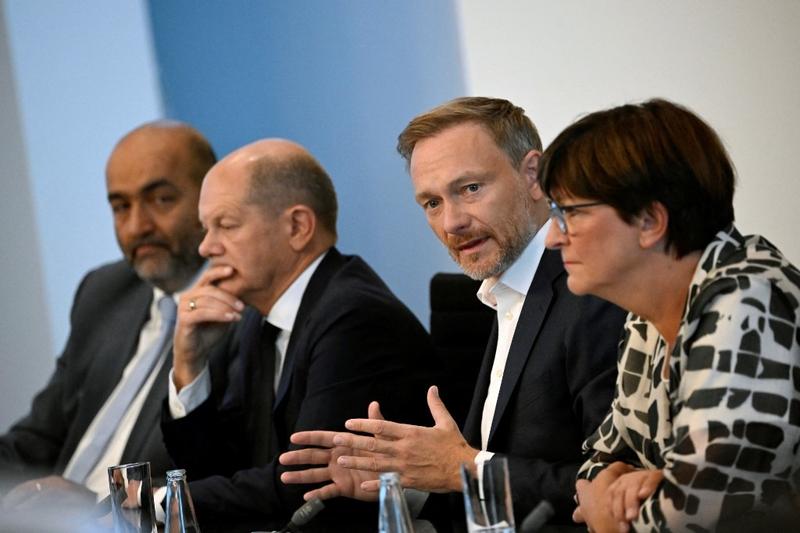 (From left to right) The co-leader of the Greens Party Omid Nouripour, German Chancellor Olaf Scholz, Finance Minister and Free Democrats Party (FDP) leader Christian Lindner and Germany's Social Democratic SPD party co-leader Saskia Esken address a press conference on the government coalition's relief plan to cope with soaring energy costs, on Sept 4, 2022 at the Chancellery in Berlin. (TOBIAS SCHWARZ / AFP)
(From left to right) The co-leader of the Greens Party Omid Nouripour, German Chancellor Olaf Scholz, Finance Minister and Free Democrats Party (FDP) leader Christian Lindner and Germany's Social Democratic SPD party co-leader Saskia Esken address a press conference on the government coalition's relief plan to cope with soaring energy costs, on Sept 4, 2022 at the Chancellery in Berlin. (TOBIAS SCHWARZ / AFP)
BERLIN - A regional election in Lower Saxony delivered mixed fortunes for German Chancellor Olaf Scholz's national ruling coalition on Sunday, with his Social Democrats scoring a clear win but the Free Democrats failing even to make it into parliament.
While the result signaled support for Scholz's Social Democrats (SPD), some experts said the drubbing of its federal coalition partner risked destabilizing Scholz's administration at a critical time as Berlin strives to avert energy shortages and further escalation of the Russia-Ukraine conflict.
The other clear winner in Lower Saxony was the far-right Alternative for Germany (AfD), reflecting a broader upsurge in support for the party across the country amid frustrations over the cost-of-living crisis in Europe's largest economy.
READ MORE: German state vote tests support for Berlin's crisis management
Overall, considered as a gauge of the national mood, the local election sent a mixed message on Scholz's three-way "traffic light" federal coalition of the SPD, Greens and Free Democrats (FDP).
Preliminary official results showed the Social Democrats (SPD) winning 33.4 percent of the vote in Lower Saxony, an economically powerful swing state of 8 million people, home to carmaker Volkswagen, though that was down 3.5 percentage points compared to the last state election in 2017
The FDP, a pro-business party that's never been a natural ideological fit with the center-left SPD and Greens, called the Lower Saxony result a "blow" and blamed, in part, his party's participation in the national administration.
"Many of our supporters feel alienated by this coalition," said FDP leader and German Finance Minister Christian Lindner.
Philipp Koeker, political scientist at the University of Hanover, the capital of Lower Saxony, said the result had the potential to destabilize Scholz's coalition at a federal level.
"The FDP will now be considerably less likely to back any policies that do not fit its program," he said. "This could even lead coalition partners to seek support from opposition parties."
Preliminary official results showed the SPD winning 33.4 percent of the vote in Lower Saxony, an economically powerful swing state of 8 million people, home to carmaker Volkswagen, though that was down 3.5 percentage points compared to the last state election in 2017.
The pro-business FDP scored just 4.7 percent, failing to make the 5 percent threshold to enter the state parliament, while the AfD was on track to nearly double its share of the vote to 10.9 percent.
ALSO READ: German economy sees signs of recession
Analysts said the SPD benefited from the popularity of its incumbent Lower Saxony premier Stephan Weil, who won his third consecutive term and is seen as a steady hand in uncertain times.
Support for the party, which lost the two previous regional votes in Germany this year, has slumped to 18-20 percent at national level after scoring 25.7 percent in the 2021 federal election.
State governments can influence national politics in the upper house of the national parliament. They also have jurisdiction over important sectors such as the local police and education, given the federal nature of Germany.
In Lower Saxony, the SPD came in well ahead of the conservatives of former chancellor Angela Merkel who were in second place on 28.1 percent, down 5.5 percentage points.
READ MORE: German inflation hits nearly 50-year high in August
The ZDF exit poll put the Greens, whose ministers are currently Germany's most popular politicians, on 14.5 percent or 5.8 percentage points more than in 2017.
That could enable the SPD to potentially break from the conservatives, with whom they have been ruling in a grand coalition in Lower Saxony, and link up with the Greens instead.



